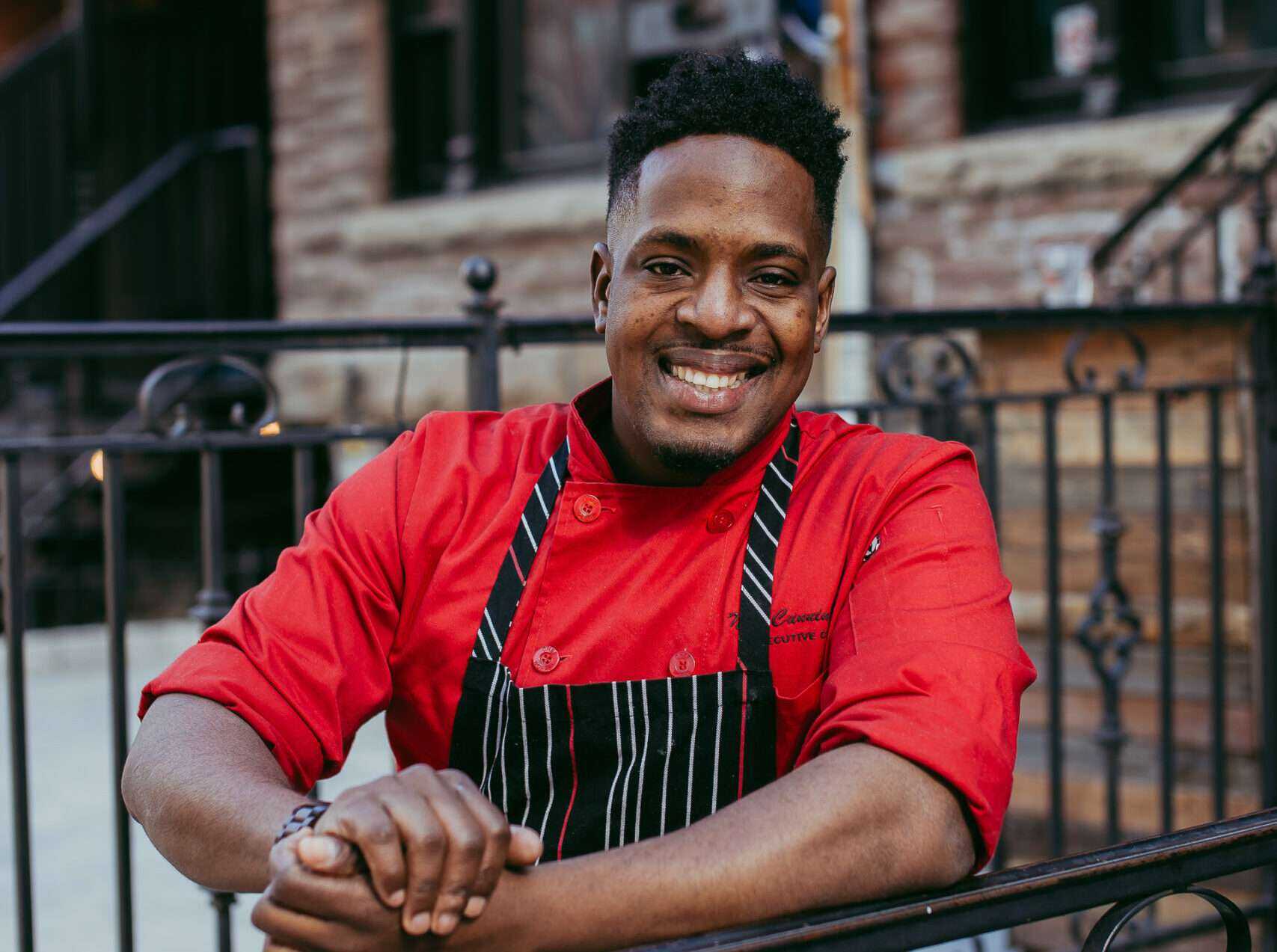on
BY SIMONE J. SMITH
“OMG! You scared me!”
I had just arrived at 300 College Street for my tasting with world renowned Chef Noel Cunningham. He was being his usual comedic self, and had startled the hell out of me.
When he opened the door, I was instantly taken back to the 80’s. The kitchen was at the end of a very long, narrow walkway. On either side of the walkway was memorabilia from the 80’s and early 90’s. There was a Pac Man arcade game, Street Fighter 3, Strike, Marvel vs Capcom, an infamous poster of Michael Jordan holding Spike Lee by his hat. It was the perfect backdrop for what was to come.
Chef Noel gave me a small tour of Freeplay, sharing with me what it had looked like before COVID-19. I could feel the energy in the place and I could understand why he had chosen to open up here. He made sure that I was comfortable, and he joined his fellow Chefs in the kitchen.
As I sat there, I could smell delicious aromas drifting from the kitchen. The manager who was there very graciously offered to make me his version of Rum Punch. I eagerly accepted, and sat there already pleased with the experience.
There is only one word I have to describe Mr Noel Cunningham, and that is FEARLESS! He went ahead and did something that a lot of people in his life tried to talk him out of, and that is open a restaurant.
As we all know, this pandemic has had a devastating impact on the restaurant industry. Never before have we seen so many restaurants forced to close their doors. Many restaurants don’t have the financial means to endure such a prolonged downturn. Small franchisees, and independent operators have had to depend on financial assistance from franchisors and from the government. Independents are having an even harder time staying afloat because they don’t have access to the loans and rent deferrals.
Most people knowing this would not think about opening a restaurant, but Noel Cunningham is not most people. On January 5th, 2020, Noel announced the opening of “Cuisine by Noel” located at 300 College Street, downtown Toronto inside Freeplay Arcade.
What is amazing is that this young man utilized his innovative mind, and excellent social networking skills to collaborate with a couple other courageous chefs to do what many thought was impossible. It has only been about two weeks, and already the restaurant has been featured in the Jamaica Gleaner, Taste Toronto and the Toronto Star.
“I am happy to be able to have this space where people can get a chance to savour my style of cooking and cuisine. People would often message me via social media to ask where my restaurant is or if I have a restaurant, so now I can answer their messages with a yes and an address.” Chef Cunningham
Opening a restaurant was the next evolutionary step in his journey. Chef Noel is notorious for blending his talent for creating contemporary Caribbean fusion-inspired cuisine with his simply sensational dishes using only the freshest ingredients.
When Noel joined me back at the table, he came back with a beautifully arranged plate, which he took the time to explain to me. What he placed in front of me was a visual sensation that I cannot quite describe. Many of us have had chicken and waffles, but not many of us have had Coconut Fried Chicken on a Festival Waffle.
Oh My God!
Noel was talking to me, but to be honest, all of my senses were wrapped up with what occurring inside my mouth. It was a perfect combination of sweet, and spicy, the waffles dipped in a honey sauce, and the crispiness of the fried chicken. It was really all too much for me. I grabbed hold of my senses, and focused in on what Noel was saying.
“Customers can expect an array of Caribbean-Fusion meal options: from Chef Noel’s smokey jerk chicken, my infamous oxtail poutine, my popular peppered shrimp and pasta, and smaller plates like oxtail arancini, ackee and saltfish spring rolls. Each day, I will offer my clients something a little different. You know, keep it fresh.
I will also be opening on Sundays for “Sunday Dinna” which is a pick up only group and family special. I want to be able to offer as much selection as possible.”
I don’t want to make anyone jealous, but I was also able to sample his oxtail, curry goat, jerk chicken, and rice and peas plate. Yum! I have already decided though, my meal of choice is the Coconut Fried Chicken on a Festival Waffle. I am heading back next week for another one, bet that!
Due to the pandemic, in-house dining is restricted but customers can pick up, takeout or get delivery with UberEats. They are open from 12 noon to 6 pm Tuesdays to Saturdays, and feel free to find out what is cooking with Noel by following him at Cuisine by Noel on Facebook, Instagram and Twitter.
Proud of you Noel; you have the Toronto Caribbean Newspaper’s continued support.
Stay in the loop with exclusive news, stories, and insights—delivered straight to your inbox. No fluff, just real content that matters. Sign up today!
We, as humans are guaranteed certain things in life: stressors, taxes, bills and death are the first thoughts that pop to mind. It is not uncommon that many people find a hard time dealing with these daily life stressors, and at times will find themselves losing control over their lives. Simone Jennifer Smith’s great passion is using the gifts that have been given to her, to help educate her clients on how to live meaningful lives. The Hear to Help Team consists of powerfully motivated individuals, who like Simone, see that there is a need in this world; a need for real connection. As the founder and Director of Hear 2 Help, Simone leads a team that goes out into the community day to day, servicing families with their educational, legal and mental health needs.Her dedication shows in her Toronto Caribbean newspaper articles, and in her role as a host on the TCN TV Network.













